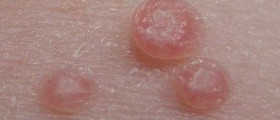
About genital herpes
Genital herpes is a common sexually transmitted disease. It is caused by a type of herpes simplex virus or HSV. The virus enters the body through small cuts or openings on the mucous membrane. The primary way of contraction of this virus is sexual contact.
Having genital herpes is, for most people, very embarrassing, and it is also very frustrating, because the virus cannot be cured completely and the symptoms may reoccur.
The problem with genital herpes is that it can be asymptomatic or its symptoms may be so mild that most people do not even know they have it. The first outbreak is the worst, but luckily many people never even experience the second outbreak. People with weak immune system, with other medical conditions or unhealthy lifestyle are more at risk of recurring herpes outbreaks.
If they do occur, the symptoms of genital herpes may include small red bumps, blisters or sores in the genial or anal area, pain and itching in the genitalia, buttocks or inner thighs. When they first appear, the bumps or blisters cause intense itching and sometimes pain as well. After some time, the blisters may burst and pus or blood may come out. After that, the scabs are formed, which eventually fall off and the sores heal.
During a herpes outbreak, it is not unusual to experience pain and burning when urinating. It is also possible to have flu-like symptoms, such as mild fever, headache and fatigue.
Prevention of genital herpes
The suggested steps for the prevention of genital herpes are the same as for any other sexually transmitted disease. Basically, the only fail-safe method of prevention is abstinence from sexual activity. This, of course, is neither easy or desired for most people, which is why it is important to engage in sexual intercourse only with trusted partners and using protection. Having multiple sexual partners significantly increases the risk of genital herpes. Using latex condoms is considered one of the best prevention methods for sexually active individuals.
It also helps to talk with the partner about his or her reproductive health. If the partner has or has had genital herpes before, it is very important to use a condom. If a genital herpes outbreak is in course, it is better to wait until it passes.
People who have had many sexual partners are advised to get checked for herpes simplex virus, especially because it is often asymptomatic. That way a person can be sure he or she will not infect others with this virus.

















Your thoughts on this
Loading...